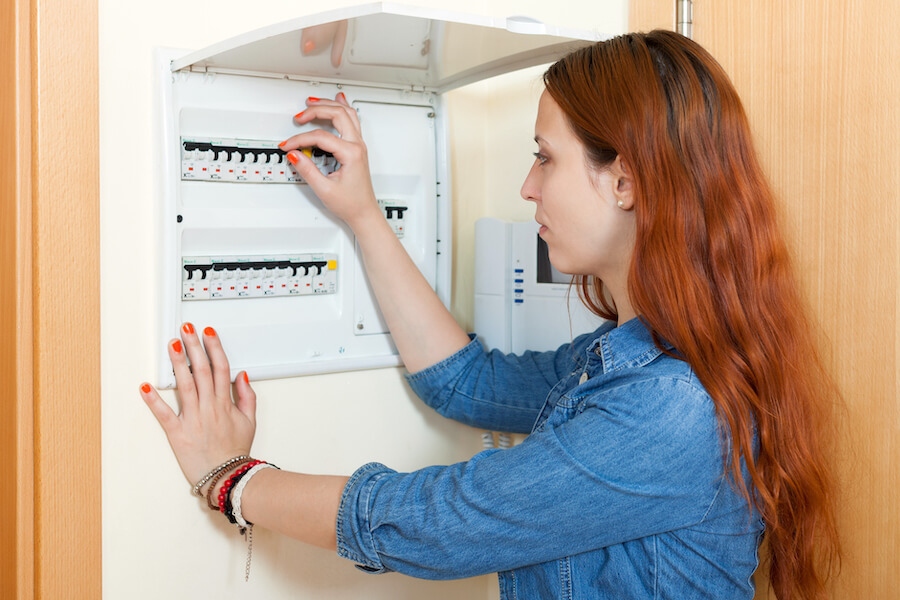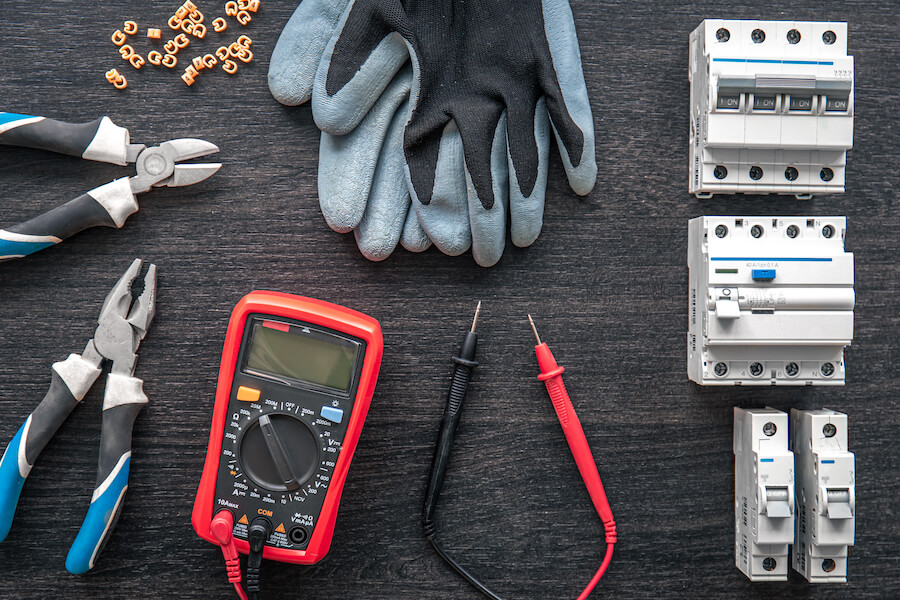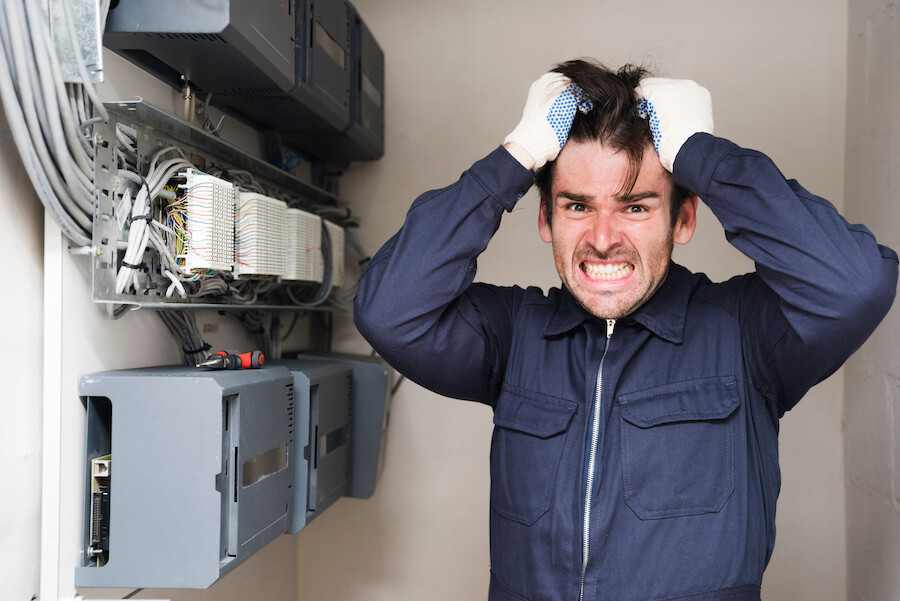Do you notice a recurring issue of power going out in your kitchen more than usual? In a well-functioning system where your Refrigerator is adequately stocked and working efficiently, this should be avoided. It should cycle on and off once every hour.

However, if you consistently experience the circuit breaker tripping every hour, there might be an issue. This doesn’t just pose a severe problem for your Refrigerator; it could also affect other appliances.
If you realize your Refrigerator is the issue, here are the potential causes and solutions.
Why your Refrigerator is Tripping the Breaker and How to Fix it
After experiencing repeated circuit breaker trips with your Refrigerator, you have to conduct a systematic troubleshooting process. This would help identify the root cause.
1. Overloaded Circuit
The circuit the Refrigerator is connected to may be overloaded with too many appliances. A course would be overloaded when the total electrical load on a specific circuit exceeds its designed capacity.
The Refrigerator may trip the breaker because the electrical demand from multiple appliances sharing the same course is more than it can handle. Sometimes, homeowners use extension cords or power strips to plug additional devices. These can put more resistance into the circuit and increase the risk of overloading.
Solution:
- Unplug the unnecessary devices sharing the same circuit
- Consider plugging the different high-power appliances into different courses.
- For future purposes, limit the simultaneous use of high-power appliances to prevent overloading. For example, run the microwave and the Refrigerator at different times.
- Upgrade your electrical panel to accommodate the increased electric demand. A trained electrician can help with this.
- Instead of depending on extension cords or power strips, consider installing additional outlets by a professional electrician. This way, you can accommodate your devices safely.
2. Faulty Outlet or Breaker
A damaged outlet or circuit breaker can trip quickly. Over time, as you use outlets and circuit breakers, they naturally suffer wear and tear. This can result in loosened connections, damage to internal components, or corrosion. Hence, they become prone to malfunction.
Solution:
- Plug another device into the same outlet. This would help determine if the issue is specific to the Refrigerator or if it affects other devices. If the outlet or breaker continues to trip with other devices, it isn’t very accurate.
- If an electrician confirms the breaker is faulty and cannot be repaired, the next step is a replacement. Replace the outlet or breaker if they are wrong.
- To prevent future damage from electrical surges, install surge protectors for your essential appliances and the main electrical panel.
3. The Refrigerator itself has Electrical Issues.
Problems within the Refrigerator’s electrical components could occur, such as a short circuit. A short course happens when a live or hot wire comes into direct contact with a neutral or ground wire.
This can happen due to damaged insulation, loose connections, or wear and tear on electrical components within the Refrigerator.
Refrigerators have various electrical components, such as the compressor, condenser fan motor, defrost heater, and control boards. Any of these components can develop and cause electrical issues within the appliance.
Solution:
- First, always ensure your safety by unplugging the Refrigerator or shutting off the circuit breaker that supplies power. Electrical circuits are hazard-prone, so it is essential to avoid contact with live wires.
- You may notice a burning smell or burnt wiring.
- Call a qualified technician to diagnose and repair the internal electrical issues.
- If the issue is related to damaged or frayed wiring, a technician will rewire or repair the damaged parts.
- If the control board, compressor, condenser fan motor, or other motorized components are the problem, they may need to be replaced.

4. Extension Cords
Using extension cords or power strips for your Refrigerator can lead to several problems. It can lead to overheating and tripping. Extension cords are prone to overheat when used with high-power appliances like refrigerators.
Besides, some extension cords are not designed to handle the Refrigerator’s current demands. This could cause overheating or other electrical issues.
Solution:
- Plug the Refrigerator directly into a wall outlet. If your kitchen does not have sufficient outlets, you should have additional outlets installed by a qualified electrician.
- Primarily, you should avoid using extension cords or power strips for your Refrigerator altogether.
- To power refrigerators, you need a dedicated electrical circuit. This is because refrigerators operate constantly and have occasional high electrical demand when the compressor starts.
5. The Size of the Refrigerator
A refrigerator with a high starting current may trip the breaker. When the compressor kicks in, it requires a surge of electrical current to get it running. Larger refrigerators typically have more powerful compressors, and as a result, they have higher starting currents.
Solution:
- Consider installing a dedicated circuit for the Refrigerator. Ensure it has the appropriate amp capacity.
- Refrain from plugging additional high-power appliances or devices into the same circuit where the Refrigerator is connected.
- This way, you can prevent overloading the course further.
6. Dirty Condenser Coils
The condenser coils are usually located on the back or underneath the Refrigerator. It can accumulate dust, pet hair, and other debris.
This buildup makes it difficult for the coils to dispel heat effectively. Accumulated dust and dirt on the condenser coils can cause the Refrigerator to work harder, potentially tripping the breaker.
Solution:
- To prevent the buildup of dust, create a routine for cleaning them. Remember to Unplug the Refrigerator before cleaning.
- You can use a vacuum cleaner with a brush attachment or a specialized coil cleaning brush to remove the debris gently.
- Ensure you clean both the front and rear coils. This way, you can improve efficiency.
7. Fluctuations in the Voltage

When the voltage supplied to your home temporarily exceeds the standard range (typically 110-120V in the U.S.), it can cause overvoltage or voltage surges.
These surges can stress electrical components in the Refrigerator. On the other hand, under voltage or voltage dips is when the voltage temporarily drops below the standard range.
Solution:
- If you frequently experience voltage fluctuations in your electrical supply, consider installing a voltage stabilizer or surge protector. These devices can help regulate voltage, reducing the likelihood of tripping the circuit breaker.
- Automatic Voltage Regulators (AVRs) can help maintain a consistent voltage level within a safe range. They automatically adjust the voltage to compensate for fluctuations and protect from overvoltage and undervoltage.
- When it becomes a recurring problem, contact your utility company to report the issue and about possible solutions.
8. Faulty Compressor
Once other issues with the Refrigerator’s electrical component have been ruled out, the compressor becomes a suspect.
A compressor is responsible for maintaining the desired temperature inside the Refrigerator. It does this by compressing and circulating refrigerant gas. When the compressor malfunctions, it can draw excessive current and trip the breaker.
Solution
- Given the complexity of repairing the compressor, it’s advisable to consult a qualified appliance repair technician.
Identifying the root problem of your Refrigerator tripping the breaker may be within your reach. However, resolving the issue would require a different level of expertise.
Remember that electrical issues can be dangerous, and it’s essential to prioritize safety when troubleshooting problems with your Refrigerator. If you need help addressing the problem, consult a qualified electrician or refrigerator technician to diagnose and resolve the issue.
